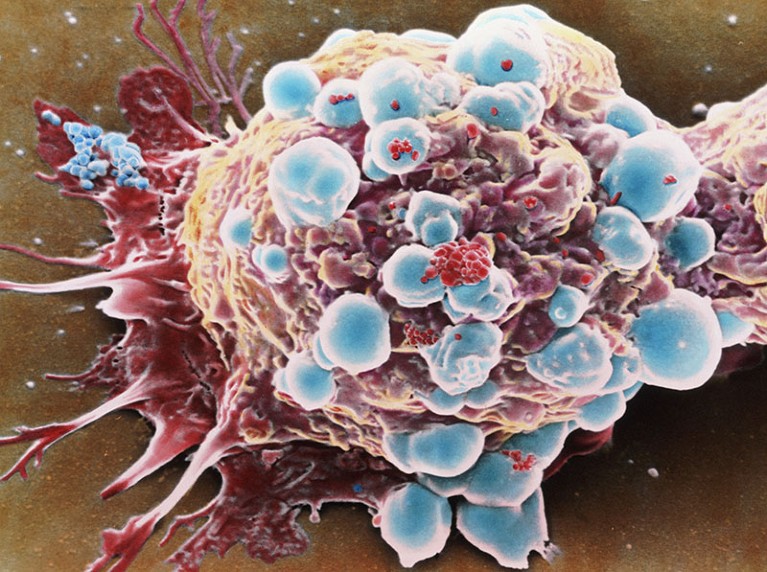Hello Nature readers,
Hello Nature readers, this is the news that matters in science today. You can also sign up to get it free in your inbox.

The number of mutations in breast cancer cells may predict how a tumour responds to immunotherapy.Credit: Steve Gschmeissner/Science Photo Library
Immune therapy hits mutated cancers harder
Tumours with a larger number of DNA mutations are more likely to respond to immunotherapies than are cancers with fewer mutations — and might result in longer survival for people who receive treatment. The tricky part: the number of mutations that predicted a good response to immunotherapy varied from one type of cancer to another. That’s one of the issues that will make it a challenge in the clinic to test patients for the best treatment.
Entire editorial board resigns over open access
The editorial board of an influential scientometrics journal — the Journal of Informetrics — has resigned and launched a competing free-to-read journal. The board wanted Elsevier to offer free access to detailed citation data, among other things. “Elsevier needs to be able to continue investing in ways that add value to the research process, which it cannot do if it gives this value away for free,” said the publisher. The former editors have launched a competing free-to-read journal called Quantitative Science Studies.
Mass fish deaths in Australia’s Darling
Mass die-offs have wiped out hundreds of thousands of native fish in Australia’s Darling River. Scientists blame a major outbreak of blue–green algae, made worse by severe weather and low water levels. The Darling is under pressure from a thirsty agricultural sector, and recent government plans to restore the amount of water flowing in the river have stalled.
100,000 twins address nature versus nurture
For diseases and conditions that hit people by early adulthood, genes account for about 40% of the variations from one person to another. That’s the result of a massive study that looked at health-insurance claims for 56,396 sets of twins and 724,513 non-twin sibling pairs (all under 25 and in the United States). The researchers combined health data with variables such as air pollution and socioeconomic status, extrapolated from people’s postal codes. Obesity, Lyme disease and lead poisoning were among the phenotypes that were most closely associated with environmental factors.
Reference: Nature Genetics paper & study website
FEATURES & OPINION
Trees are not enough
With nations making little progress controlling their carbon emissions, many are turning to planting trees to slow global warming. Nobody denies that trees are good for the environment, but forests have more-complex and uncertain climate impacts than policymakers, environmentalists and even some scientists acknowledge. Nature explores the science that underlies a volatile and urgent debate.
Payouts push professors towards predatory journals
South Africa must stop paying academics by the paper, argues geographer David William Hedding, because the practice incentivizes corrosive practices, such as salami-slicing research and targeting low-quality journals. Hedding enumerates how the government could spread the money in ways that will encourage good research.
A guide to making great scientific figures
Biologist Claus Wilke’s new book on creating accurate, clear and compelling data visualizations dips into everything from picking the right colours to how to choose the best software for you. Wilke has kindly put the complete draft (which was written completely in R) online to read for free.
